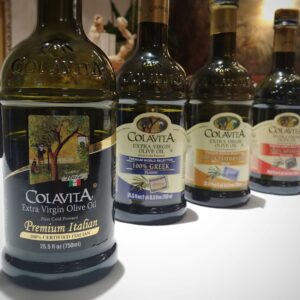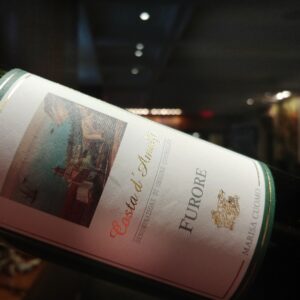American Businesses Still Threatened by European Wine Tariffs
In the middle of Midtown Manhattan in New York City, at the Southern Italian restaurant The Leopard at des Artistes, I was witnessing one of the things that makes the United States so great: two different Italian wine companies telling their stories of finding success here in the US, and hence, not only creating more jobs for Americans, but helping to give opportunities to other small American businesses. An Italian olive oil company, Colavita, and Italian wine importer, Panebianco, spoke not only about their handshake partnership of coming together to sell quality olive oil and wine, but also about the families that they have worked with through the years–in Italy and the US–and how both businesses were based on relationships of entrepreneurs supporting each other in a world that could seem ruthless and uncertain at times.
European Wine Tariffs
Since last October there has been a trade war with Europe that was first instigated by the World Trade Organization ruling that the European Union’s subsidies for France-based manufacturer Airbus, American-based Boeing’s rival, were not up to the standards of fair trade. The US was therefore given permission to legally impose $7.5 billion in tariffs on European goods. President Trump quickly implemented 25% import duties on an array of European products, including a significant number of French, Spanish, German and English wines. This article is not meant to jump on the bandwagon of criticizing President Trump for every action under his administration (although, as a liberal, I am personally not a fan of his) as I not only feel that it is not helpful but that it is more important to explain how these tariffs are already affecting small American businesses and what additional tariffs might do to those small wine stores and restaurants that many of us hold dear.
The wine business is a low margin business and October, November and December (known in the business as OND) is the time of year when many in the business either make their profit for the year or hopefully at least break even. People go into the wine industry not to make money but to sell a product that they are passionate about, as well as to be a part of a community of those who love wine and food and the stories behind them. And so, unexpectedly activating these tariffs has already hurt many wine businesses in the US as not only does every penny count, but it has happened during the time of year when many restaurants, retailers and importers can get out of the debt that they have accumulated throughout the year to survive. And now President Trump has threatened the European Union with up to 100% tariffs on European products such as olive oil and wine. This could include all countries in the EU including Italy.
Many have recently, mistakenly, thought that the threats of these possible tariffs were over as President Macron and President Trump have agreed to put them off, yet the tariffs that they have agreed to suspend are a separate set on French luxury goods that include Champagne to retaliate against France’s digital tax on companies such as Google. The potential 100% tariffs on European products that are associated with Airbus are still on the table. This would significantly raise prices for many products that small restaurants, retail stores and importers use to help differentiate themselves, and it is estimated that many of these businesses will go under in six months. This would additionally cause further damage through loss of jobs at bigger companies. The projected damage has been summed up as follows: lost taxes, $43 million; state excise taxes lost, $3 million; third-party logistical service provider losses, $51 million; other support vendors, $123 million; lost jobs, $101 million; federal and state income tax losses, $39 million.
Colavita and the Panebianco Partnership
When I think back to September and that wonderful lunch at that Southern Italian restaurant in NYC with Giovanni Colavita, CEO and President of Colavita USA, and Nunzio Castaldo, President of Panebiano Wines Import, and their stories of success here in the US and bringing together Italian families such as winemakers and olive growers, with American family businesses of restaurants and retail stores, my heart aches thinking that I had no idea that these vital relationships could be destroyed in a matter of months. Giovanni described the beginnings of his family’s olive oil business, “Forty years ago, in 1979, my uncle Enrico came to the United States looking for a partner and found John Profaci and John is still a partner with the company today that was based on a handshake deal.” He continued, explaining that Colavita could not compete with bigger olive oil companies that dominated Italy and so they came to the US to introduce higher quality extra virgin olive oil by proposing their oil to chefs to use in their quality cuisines.

Colavita became partners with the CIA (Culinary Institute of America) donating a tremendous amount of money to help further the culinary education of Americans who had the passion and drive to enter the service industry. Also, Colavita has raised the quality bar as well as the perception of olive oil while spurring a growth in jobs and revenue in the US as they have two locations within the US for distribution; with the one at their California location that blends and markets the olive oil from olive farmers in California. Their production not only covers a range of olive oils in Italy, California, Spain and Greece, but they also distribute vinegars, pastas and packaged tomatoes. What’s more, they recently decided to get into wine as well.
Colavita’s desire to get into quality wine made by families instead of conglomerates was a desire that started as far back as with Giovanni Colavita’s grandfather, and this passion for wine led him to Nunzio Castaldo and their partnership with Panebianco Wines Import. Nunzio is also a fellow southerner, coming from the area of Naples as Giovanni’s family comes from the nearby Italian southern area of Molise. Nunzio had been in the wine industry in America for 34 years and worked for one of the most important importers of Italian wines; his job focusing on Italian family wineries. He had the chance to purchase Panebianco after the owner, who was legendary for championing Italian small, family producers, passed away. Once Nunzio met Giovanni from Colavita he knew they could work together to keep the Panebianco Wine Import’s mission alive. “Family and quality has always been the mission” of the Panebianco Wine Import business and Nunzio further noted, “once I shook the hand of Giovanni Colavita I knew this was the right family to take care of these family wine producers.”
These gentlemen’s stories are key to understanding how many American mom and pop stores and restaurants survive, as it gives them a chance to offer something special and different that is rooted in heart and passion. This is what helps them to compete with large chain stores or restaurants, especially when it comes to wine. They sell wines that are built on relationships and keep small family businesses alive. The American wine business is a complicated one as each state has its own set of alcohol laws and so that is why there are tiny importers that sometimes specialize in only one state. From Mobile, Alabama to New York City there are local people who are bringing in small producers from all over the world and allowing small businesses to offer a competitive edge of boutique producers who manage to compete with chain stores.
Many Democratic and Republican representatives across the US, from North to South and states in between, have signed letters about their concerns for the potential negative impact on American wineries and the local economy. US wineries as well, such as Tablas Creek in Paso Robles have written posts that discuss the damage that these tariffs will cause for California wineries. It may be difficult to understand why placing tariffs on European wines, or other goods, would be detrimental to the US but the best way to think of it is that the international wine business, and other specialty products, can be divided into large corporate companies against small/family-run businesses instead of dividing it up into US against Europe. These smaller, family-oriented businesses are always fighting the corporate world to stay alive and so that is why there has been a long relationship between European and American small businesses with family values as there is strength in numbers.
In an odd way the complicated US wine distribution laws have allowed small, locally owned importers in each state to stay alive amidst major pressure from the conglomerates because small guys who know the local laws and landscape are necessary. These small guys import small producers and sell only to small businesses that can offer something special to their customers. If these tariffs wipe out these small guys, the huge distributors will take over the whole US market and it will not only take away local jobs and businesses but many small American wine producers will no longer be distributed into other states because big distributors and retailers won’t carry them. As a result, the small importers will cease to exist; consequently, the mom and pop stores will have nothing special to offer to help them compete. This is one of the reasons that leading EU and US wine trade groups recently signed a landmark statement backing zero tariffs from both sides of importing wines, because American wine producers know that these tariffs will only damage the sales of their wines.
Fighting Before It Is Lost
The idea of protecting European wines and other products may seem superficial, but at the heart of it we are not only talking about destroying many American lives but taking another step toward killing the American dream of supporting small business owners. Giovanni Colavita mentioned that a huge American company wanted to buy their US operation from their US partners but they decided to buy it straight out themselves instead, thus keeping Colavita as a whole in the family, staying true to their farmers as well as keeping an important place for their original American partner John Profaci. They wanted to keep this business not only for the Colavita generations to come but to keep the company still friendly to all those small businesses they have gotten to know over the years here in the US. They will use their olive oil success to help sustain family wineries, making small quantities of wine under tough conditions that will enable all those mom and pop shops/restaurants to give customers a reason to make a special trip to their place to find a hidden gem.
When I left that lunch that was filled with stories of farmers, American small businesses and families, I looked at all the restaurants and stores lining the streets, and although many have closed with more and more major chains taking over, there were still those neighborhood restaurants and wine stores holding on for generations. Little did I know that they could potentially be gone by the end of 2020. When I think back to all those small book stores and homemade clothes and accessory boutiques that are long gone from NYC, I regret not doing more to try to save them. And now that they are gone and the juggernaut of Amazon sales has taken over, it has become impossible to bring those places back. But these specialty goods, especially wines that are weighed down by a multitude of regulations that keep a company like Amazon from completely taking over, are still the last bastion for those charming, locally owned places on all the Main Streets across America to be able to survive. And it is not too late to keep the American dream alive, we still have time but the time is now.
If you are concerned about your local businesses that will, or may already, be affected by these tariffs, please take a couple of minutes to send a message to your local representative via this link.
Everyday Drinking Wine (less than $15)
2016 Poggio Salvi, Caspagnolo Chianti Colli Senesi, Tuscany, Italy ($14.99): mostly Sangiovese with a small amount of Merlot. We did not have this wine at the lunch but this producer is a part of the Panebianco portfolio of Italian wines and it is an unbelievable value for the quality. Beautiful floral and red cherry notes with juicy fruit on the palate with a hint of earth.
Special Occasion Wine (from $15 to $50)

2013 Cantina della Volta, Lambrusco di Sorbara Rosato Millesimato, Sparkling Rosé, Emilia Romagna, Italy ($34.99): 100% Lambrusco di Sorbara. This is an extremely refined Lambrusco Rosato sparkling wine that has been aged for over 40 months on the lees. Layered with complex aromas and flavors of wet stones and white flowers with hints of toast and zingy cranberry flavors.
2018 Marisa Cuomo, Furore Bianco, Campania, Italy ($34.99): 60% Falanghina and 40% Biancolella. Marisa Cuomo is a revolutionary woman who has vineyards on the side of a cliff along the Amalfi Coast who makes incredible white wines such as this one. She shocked people in the 1960s as a young woman with her small children harvesting grapes that were over 1,000 feet above the Tyrrhenian Sea and now she is a legend. This wine was enchanting with rich peach and nectarine flavors with layers of Mediterranean herbs and citrus peel on the long, expressive finish that begged for another sip.

2012 Venturini, Recioto della Valpolicella, Veneto, Italy ($34.99 for 500ml bottle): 70% Corvina Veronese, 25% Rondinella and 5% Molinara. A classic Italian sweet wine made from the labor-intensive practice of drying grape bunches that is an ideal pairing for cheese. Rich fig and ripe black berry flavors with tobacco, dried herbs and baking spices bring this lush sweet wine to another level.
Fantasy Wine (over $50)
2013 Capo di Stato, Montello Venegazzù DOC Superiore, Veneto, Italy ($59.99): a field blend of Cabernet Sauvignon, Merlot, Cabernet Franc and Malbec. This is a legendary family winery tucked away in the small wine area of Montello in Veneto that has historically made great Bordeaux style wines that are known for their vitality and purity of expression. Layers of complex aromas of fresh leather, wild brambly fruit and a smoldering cigar note that made every sip addictive. The fine tannins had a focused energy that gave a thrilling precision to the body. A wine that is riveting in its subtle, natural grace and Capo di Stato only gets more elegant with age.












